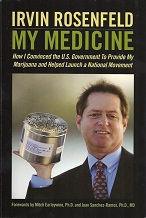
Mr Ducey cited the "unintended consequences" of legalisation in Washington and Colorado, particularly the way marijuana "has infiltrated high schools with brownies and cookies and Pez dispensers and all-day suckers." A spokesman for Mr Ducey also pointed to reports of newborns testing positive for THC and increases in emergency department visits involving marijuana.
The debunk;
Mr Ducey, your time is over and the rhetorical propaganda you preach is old and scientifically proven to be lies. If anything, cannabis is a good alternative to opioid addiction. It's certainly not " the Gateway drug " that you suggest when saying " it would exacerbate the state's existing opioid problem", but maybe it will be the medicine you need in the future? Let's see then if you reject or embrace it.
The governor also challenged the idea that marijuana is a safer substance than alcohol.
"I would check your facts when you say something is not addictive, that something's safer than alcohol," he said.
Mr Ducey didn't give specifics about the relative dangers of marijuana and alcohol, but enjoying a drug policy fact check, we're happy to indulge the governor's request.
Here's what the research has to say.
1. Is marijuana addictive?
Short answer: yes. The best available research indicates that roughly 9 per cent of people who use marijuana - 1 in 11 - will eventually become dependent on it. Starting marijuana use in your teens roughly doubles the risk of dependency, at 17 per cent.
It's worth pointing out that the study those numbers come from found a similar risk of dependency for drinkers who started in their teens, and higher rates of dependency for drinkers who began in adulthood. And dependency rates for tobacco were higher across the board.
The debunk;
For people in chronic pain, cannabis could be construed as be "addictive" although I don't think "addictive" is really the appropriate term. It has analgesic properties (amongst other medicinal qualities) with few negative effects and very low toxicity if any?. Now I'm not talking about smoking cannabis! or mixing it with tobacco or having three beers then smoking a joint.
Smoking any plant material creates carcinogens and tar.
The safer method of consuming cannabis is either ingesting or vaporising.
from Wikipedia:
Addiction exacts a high toll on individuals and society as a whole through the direct adverse effects of drugs, associated healthcare costs, long-term complications (e.g., lung cancer with smoking tobacco, liver cirrhosis with drinking alcohol, or meth mouth from intravenous methamphetamine), the functional consequences of altered neural plasticity in the brain, and the consequent loss of productivity.[14][15][16] Classic hallmarks of addiction include impaired control over substances or behavior, preoccupation with substance or behavior, and continued use despite consequences.[17] Habits and patterns associated with addiction are typically characterized by immediate gratification (short-term reward), coupled with delayed deleterious effects (long-term costs).[18]
Examples of drug and behavioral addictions include: alcoholism, amphetamine addiction, cocaine addiction, nicotine addiction, opiate addiction, food addiction, gambling addiction, and sexual addiction. The only behavioral addiction recognized by the DSM-5 is gambling addiction. The term addiction is misused frequently to refer to other compulsive behaviors or disorders, particularly dependence, in news media.[19]
Cannabis users, be it recreational or medicinal are not generally thieves. Their desire for cannabis does not lower their integrity to procure it.
Cannabis is non toxic or extremely low toxicity, no overdoses, ever!
Cannabis does not "exact a high toll on individuals and society". Legalised and educated, it would improve society for many reasons.
Such as; Education on the safest delivery method, such as vaporising, eating raw plant and extracted oils. STOP USING TOBACCO to mix with it!
Mixing alcohol and other pills with cannabis is risky, though very common.
Education on the right strain of cannabis is also very important, though all strains are medicinal in some form.
In Summary; Cannabis gives a feeling of well being and comfort to people with chronic pain, with little to no toxic reactions.
Anecdotally, it's curing many different types of cancer and helping sufferers of MS, epilepsy, PTSD, Crohn's, amongst many other diseases.
Sufferers of chronic pain need daily medication to perform their normal day to day functions, to enjoy life and work without pain, is this addiction? I don't think so.
I don't know where the "9 per cent statistic" came from, but considering fear of reprisal cannabis users around the world face, I doubt very much it's accuracy.
Alcohol makes you fearless and potentially stupid - cannabis makes you cautious and hopefully less likely to say and do stupid things.
Hence why the dangers of driving under the influence of Alcohol can't be compared with driving under the influence of cannabis.
Alcohol fuels violence - cannabis fuels peace (hence the lack of violence since it's prohibition)
Alcohol is a poison (toxic)- cannabis is a medicine and non toxic (very rare to have a non toxic medication)
Alcohol is legal - cannabis is illegal, this is the part that just doesn't make scientific sense, considering the facts.
We discovered in the mid 90's that the human body has an Endocannabinoid system, proving our human bodies were designed to consume cannabinoids such as THC and CBD, etc. We are yet to discover the alcohol equivalent, but not through lack of trying.
2. Is marijuana safer than alcohol?
This is a much more complicated question. The short answer, again, is "yes," but there's more nuance here.
For starters, as noted above, marijuana users are less likely to become dependent on the drug than drinkers. Overall, research suggests that 15 per cent of drinkers become dependent on alcohol.
Marijuana is also considerably less toxic to the human body than alcohol. Compared to marijuana, there's a much smaller difference between a "recreational dose" of alcohol and a "fatal dose." If, say, five shots get you drunk, 15 could kill you.
With pot, on the other hand, there's currently no known fatal dosage level - at least not any that a human being could reasonably consume in one sitting.
Marijuana impairs people differently than alcohol does, too. US crash data show that the odds of getting into a car accident jump dramatically after a person has been drinking alcohol. The odds don't change much after smoking weed. Other research has shown similar findings.
Debunk:
Which begs the question, why the need for inaccurate MDT units?
The Us Department of Transportation commissioned several independent studies on the danger of driving on cannabis.
http://www.medicalmarijuana.com.au/images/feedgator/images/pdf/Drug_and_Alcohol_Crash_Risk.pdf
In saying the above, new cannabis users need to adjust to the effects of cannabis prior to driving. The good thing is they usually have the sense not to drive if this is the case.
Alcohol also appears to be much more closely linked to violent behaviour than marijuana is. Researchers Mark Kleiman, Jonathan Caulkins and Angela Hawken summed up the literature on drugs and violence in 2011: "Most illicit substances have a much weaker link to violence than alcohol does. ... There is little direct association between marijuana or opiate use and violent crime."
For all of the reasons above, many drug policy experts agree that, on balance, marijuana is less harmful to both individuals and society than alcohol. That was the conclusion reached by a group of researchers for an article in the Lancet in 2010, which graded several common drugs on 16 potential harms to users or society.
But just because marijuana is safer than alcohol doesn't mean that it is safe, full stop. Some research has linked marijuana use to a number of negative physical and mental health outcomes, like a heightened risk of psychosis and the potential for long-term cognitive impairment. Those risks appear to increase for people who use the drug heavily and for those who start using it in their teens.
Some researchers also say that the perennial debate on the relative harm posed by marijuana and alcohol is incomplete. Jonathan Caulkins of Carnegie Mellon University prefers to say that "marijuana is safer than alcohol, but it is also more likely to harm its users".
Professor Caulkins points out that federal survey data show that current marijuana users are more likely (21 per cent) to meet diagnostic criteria for abuse or dependence on the drug than current alcohol users (13 per cent).
"While alcohol is more dangerous in terms of acute overdose risk, and also in terms of promoting violence and chronic organ failure, marijuana - at least as now used in the United States - creates higher rates of behavioral problems, including dependence, among all its users," Professor Caulkins wrote for the magazine National Affairs earlier this year.
Of course, some of those signs of abuse or dependency (trouble with the law related to the drug or problems at work, home, school or with friends), could be direct consequences of the drug's illegal status. So it's difficult to compare apples to apples on that measure.
So...
In conclusion, marijuana is addictive, although less so than alcohol. And very broadly speaking it is safer than alcohol, but it still poses a number of risks to its users.
In July, one American poll showed only 39 per cent of likely voters said they'd vote to legalise marijuana in November. But Arizona voters might be warming up to the idea of recreational pot, according to an Arizona Republic/Morrison/Cronkite News poll conducted in the second half of August. In those results, released on Wednesday, 50 per cent of registered voters said they were likely to vote in support of the measure.
According to survey data published online last month in the Lancet, marijuana use is becoming more accepted among adults as states have loosened pot laws.
In response to a Washington Post inquiry, a spokesman for Mr Ducey said that "the governor stands by his position, and believes the facts speak for themselves on this topic when you look at the unintended consequences in Colorado and Washington".
Washington Post, AP
Please comment below to discuss any risks or concerns with cannabis as a medicine.
reference: http://www.smh.com.au/world/the-factcheck-on-whether-pot-is-safer-than-alcohol-20160909-grdahu.html
Latest
Coronavirus Strikes Massachusetts Cannabis Company Employees
Reassessing the Essential: Cannabis in the Time of a Pandemic
5 Reasons To Try Aspen Valley CBG Flower (30% Off)
High Times Cannabis Cups Go Virtual In Wake Of Coronavirus Pandemic
Drug Enforcement Administration Proposes Plan To Expand Cannabis Research
Ghana Legalizes Cannabis For Medicinal And Industrial Uses
The cheapest legal weed in Canada: Discover these cannabis ‘value brands’
Cannabis and coronavirus: Here’s what you need to know
cannabis designs
The Best Of
WHO Rules CBD Should Not Be a Scheduled Drug

Dr Cristina Sanchez PhD video interview on medical marijuana and cancer

Biochemist Dennis Hill interview; Cannabis oil as a cure for cancer.

The unofficial World Record holder for cannabis smoking part 1




